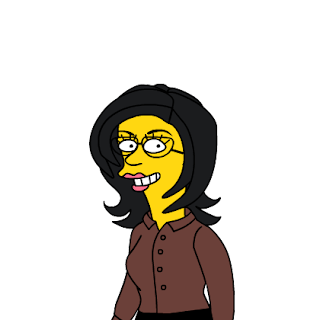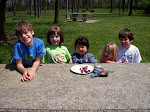I recently skimmed through a very interesting book entitled, "Einstein Didn't Use Flashcards" . The book was written by three women with doctorates in early childhood education and such related fields. The gist of the book is that parents should let their young children just play. Why in the world it would take a person with a PhD. to point out the obvious is beyond me. But I guess we've become such an expert based society that we can't even just let little kids play unless the experts tell us it's okay.
It reminds me of a visit I had with our middle daughter when we first brought her home from Kazakhstan. She was barely 2 years old and we had her assessed by almost every specialist known to man. During those evaluations we spent some time with an occupational therapist. Because our daughters hands and fingers are unusual in design, the therapist gave us home therapy.
Playing with legos
Playing with blocks
Playing with toys that have buttons
Playing in sand boxes
Playing with sewing cards
Playing with stacking cups
Playing with play dough
Each of these activities were written on a sheet of paper, and at the bottom, there was a warning.
"Warning: these activities are to be done only under adult supervision. Do not allow your child to engage in these therapies without the consent and guidance of a trained professional."
So, is the trained professional a therapist or a person who works for Lego or Playskool?
It's not unlike a recent article that I read about a new therapy used for children with ADHD: Green Therapy. No, this is not the green therapy involving marijuana. As I read the therapy description I realized that these ingenious experts had figured out that kids with high energy levels needed to spend time playing outside! Again, it takes an expert to figure that out??
At any rate, these three ladies wrote a great book (I only skimmed it because I have lived the birth -5 years enough times I'm kind of familiar with the territory), and I would recommend this book to any parent with a young child. There was so much that I agreed with, which, of course, from my perspective, is why it is such a good book!
This book inspired me to create a list of things that I have found to be very useful for raising a child from birth to age 5.
1) T.V. is not for infants and toddlers (no matter what Baby Einstein says!), and should only be commercial free for older kids
Only people trying to sell products are telling parents to put their infants and toddlers in front of the T.V. for any purpose. Reliable "experts" are not advising parents that because all the research has shown that you shouldn't set your kid in front of a T.V. set before age 2, and even then you should limit it to less than 1 hour a day. Ditch the Baby Einstein videos and wait until your kids are old enough to sit in front of the T.V. and watch something interesting. And, when they're old enough, put off commercial T.V. as long as possible. If you do PBS and only PBS, an amazing thing happens. First of all, they don't sit there and learn how to covet the latest toys being marketed (marketed by people who attend conference workshops entitled "how to override the parental veto, no less) to children, and, as a result, they are actually content with what they have! They'll still find out what's out there, but they won't sit there and be systematically programmed to covet it. Secondly, of course, they are actually learning something some of the time. And, thirdly, they will gradually lose interest and not want to really watch T.V.
We also don't get "National Geographic Kids" for the same reason. Every other page in that magazine is an ad for a new junkie breakfast cereal, movie, or video game. It's an education that I don't really want my kids to have (or to pay for!). You get a better magazine in "Ranger Rick" from the National Wildlife Federation.
3) The most interesting thing you can put in front of your baby is your face.
I would love to talk to the creators of Baby Einstein. Since it wasn't around when my boys were babies, I've tried to figure out how they turned out so smart. Or my daughters, who had next to no stimulation in impoverished orphanages. Trust me, there was no Baby Einstein there! Yet, they are all smart and excellent students.
Buy standard toys from toy stores, don't worry about colors in your babies sheets, plates, cups and utensils or the patterns in their bath towels. I mean, somehow humanity has moved forward for all these thousands of years without specialized toys for babies and toddlers!
When my boys were babies, their favorite toy was us. They were fascinated with our faces, fascinated without voices. They loved to be held and read to (even as infants), sung to, bounced on our knees etc. You and a few simple toys are much more valuable than anything else, and the baby gym produced by a smaller company is no less a toy than one designed by "Baby Einstein".
4) Anything that can be taught from educational computer software can be taught better from a book, or basic crayons and paper.
5) The less the toy the better the educational value
They get more out of boxes, dirt, bugs, blocks, lincoln logs, paper, crayons, scissors (watch the hair though) and other such toys than a leap pad. Honestly, I don't even call leap pads educational toys. They're fun, but your kid is much better off getting dirty by learning to explore his world and use his imagination.
6) Classes for kids under the age of 4 are ridiculous, take them only if you want to have fun with your kid not for any educational value.
Fun is the only value in them. I taught, for one semester, a piano class to 2 and 3 year olds. It was ridiculous. What took them 3 months to learn could be learned in a couple lessons when they turned 6 or 7. It can be fun to take a class with your toddler, but just don't expect them to learn anything that you couldn't have taught them.
7) Outside of the obvious things (such as prenatal nutrition and maternal health) you don't need to do anything with your fetus to help it develop.
The Mozart Effect has been debunked, and, well, your baby doesn't speak English, so it doesn't matter if you are talking to it, or to someone else. He/She just really doesn't know. So instead of worrying about "prenatal parenting", then just enjoy the fact you're going to have a baby! And, then, just enjoy your baby when he/she is born.
What's really sad about all this marketing is that its taking a culturally unhealthy childhood and extending it all the way back to infancy (or even prenatally)! Is the only time in life where people can just "be" when they're about to die?
Saturday, December 8, 2007
Einstein, Babies and Flashcards
Posted by
Deb
at
4:48 PM
![]()
Labels: adoption family, babies, Einstein, parenting
Subscribe to:
Post Comments (Atom)






No comments:
Post a Comment